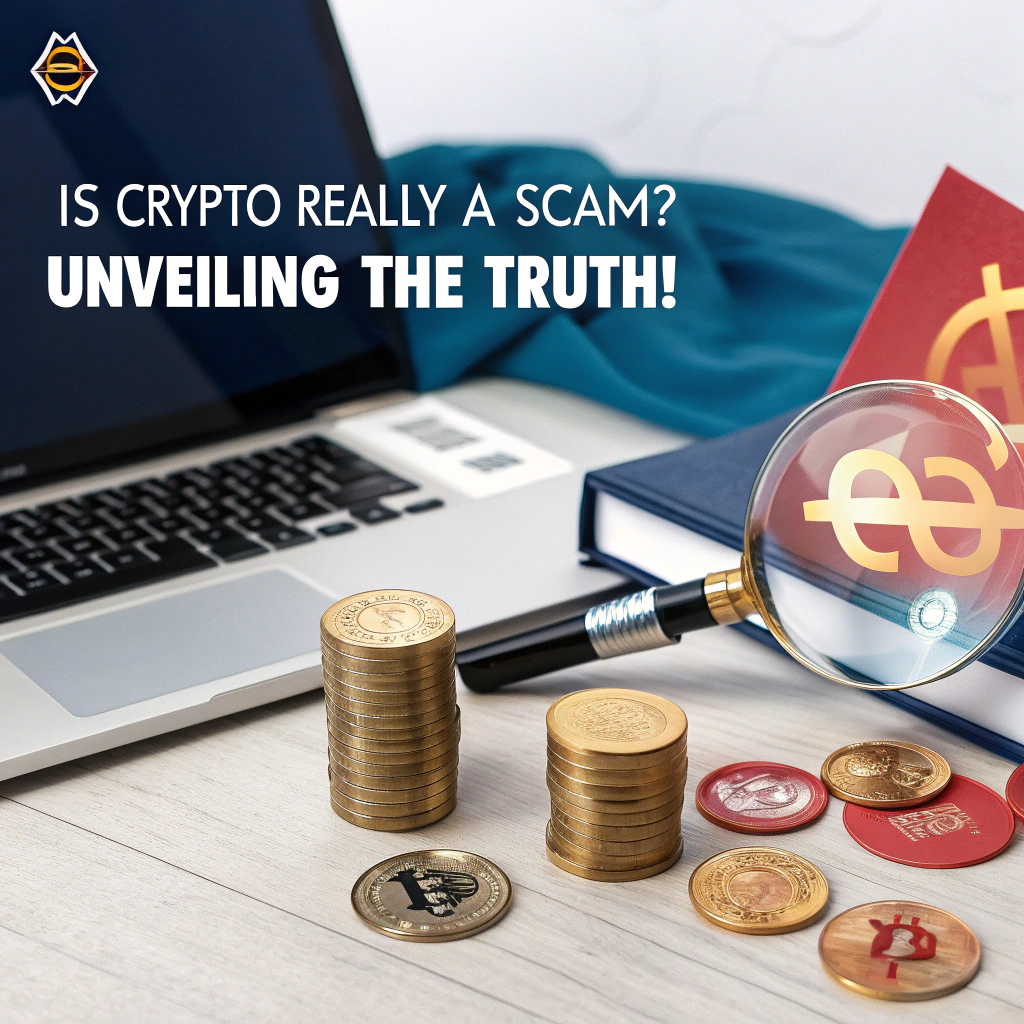Unraveling the Myth: Is Crypto a Scam?
The rise of cryptocurrencies has been meteoric, yet it has been fraught with skepticism and concerns about its legitimacy. The burning question many have is, “Is crypto a scam?” To answer this, we must delve deep into the intricate world of digital currencies, exploring their functionalities, potential benefits, and inherent risks.

Understanding Cryptocurrency
Cryptocurrency refers to digital or virtual currencies that leverage cryptographic techniques to secure their transactions and to control the creation of new units. Unlike traditional money issued by governments, cryptocurrencies operate on decentralized networks using blockchain technology. This technology is essentially a distributed database that maintains a continuously growing list of records, known as blocks, which are linked using cryptography.
Legitimate Uses and Benefits of Cryptocurrencies
Despite crypto scam concerns, there are numerous legitimate applications for cryptocurrencies:
- Faster and Cheaper Transactions: Cryptocurrencies enable peer-to-peer transactions, bypassing banks or financial institutions, which often results in lower fees and quicker transfer times, especially internationally.
- Blockchain Applications: Beyond currency, blockchain technology has shown promise in sectors like supply chain management, voting systems, and even real estate to name a few. Its ability to provide transparency, traceability, and security makes it invaluable.
- Privacy and Anonymity: Some cryptocurrencies like Monero or Zcash offer enhanced privacy features, attracting users who value anonymity in their transactions.
Exploring the Shadows: Risks and Common Fraud
Here’s where things get murky. While the legitimacy of crypto is real, the ecosystem has seen its share of fraudulent schemes:
- Ponzi Schemes: Investors are misled by promises of high returns from non-existent cryptocurrency projects.
- Phishing: Fraudulent attempts to steal users’ sensitive information like private keys or wallet details.
- Rug Pulls: A situation where developers disappear with investors’ money, often inflating the price of a token artificially before crashing it.
These scams give fuel to the crypto fraud questions and feed into the narrative that cryptocurrencies might be fraudulent by nature. However, it’s important to differentiate between the technology and its misuse.
.
The Role of Regulation
The absence of strict regulation in the crypto space has undoubtedly facilitated fraudulent activities. However, a silver lining is that global regulatory frameworks are gradually being developed:
- Governments are beginning to define cryptocurrencies within legal frameworks, aiming to protect investors.
- Regulators are working on Anti-Money Laundering (AML) and Know Your Customer (KYC) standards for crypto exchanges.
Latest Trends and Innovations in Cryptocurrency
Cryptocurrencies and blockchain technology are constantly evolving. Here are some recent developments:
- DeFi (Decentralized Finance): DeFi aims to recreate traditional financial systems using blockchain, offering services like lending, borrowing, and trading without traditional intermediaries.
- NFTs (Non-Fungible Tokens): These unique digital assets representing ownership of items like art, collectibles, or virtual real estate.
- CBDCs (Central Bank Digital Currencies): Many countries are experimenting with or planning to introduce digital versions of their fiat currencies.
Advice for Newcomers
If you’re considering entering the world of cryptocurrencies:
- Education: Understand what you’re investing in. Learn about blockchain, cryptocurrencies’ mechanics, and the market’s volatility.
- Reputation: Invest in cryptocurrencies with proven track records and robust security measures.
- Security: Use reputable wallets, enable two-factor authentication, and keep your private keys secure.
- Investment Strategy: Consider long-term investment strategies, as crypto investments can be highly speculative.
Conclusion
In conclusion, the narrative that is crypto a scam must be nuanced. While are cryptocurrencies scams can be a legitimate concern due to the plethora of fraudulent activities, dismissing the entire cryptocurrency and blockchain sector as a scam would be inaccurate. Cryptocurrencies hold real-world value, serve legitimate purposes, and offer transformative potential. However, the onus is on investors to conduct diligent research, remain vigilant against scams, and embrace regulatory changes that aim to bring legitimacy and security to the crypto world. The future of cryptocurrencies hinges on continued innovation, education, and an embrace of regulatory oversight to ensure it thrives as a trustworthy financial tool.
FAQ
Is crypto a scam?
No, cryptocurrency itself is not inherently a scam. However, the crypto space has attracted fraudulent schemes and scams. It’s important to research and understand the technology and the specifics of any crypto project before investing.
Why do some people believe that cryptocurrency is a scam?
Some people believe cryptocurrency is a scam due to: high-profile frauds like Ponzi schemes, the volatility of crypto prices, lack of regulation, and the anonymity that can facilitate illegal activities. Additionally, the complexity of the technology can lead to misunderstandings and skepticism.
How can I avoid cryptocurrency scams?
To avoid cryptocurrency scams: conduct thorough research, use reputable exchanges, never share your private keys, be wary of promises of high returns with little risk, and stay informed about common scam tactics like phishing and Ponzi schemes.
What are some red flags to watch out for in crypto investments?
Red flags in crypto investments include: guarantees of high returns, pressure to invest quickly, lack of clear information about the project, anonymous teams, and unsolicited offers. Always verify the legitimacy of the project and its team before investing.

No comments yet